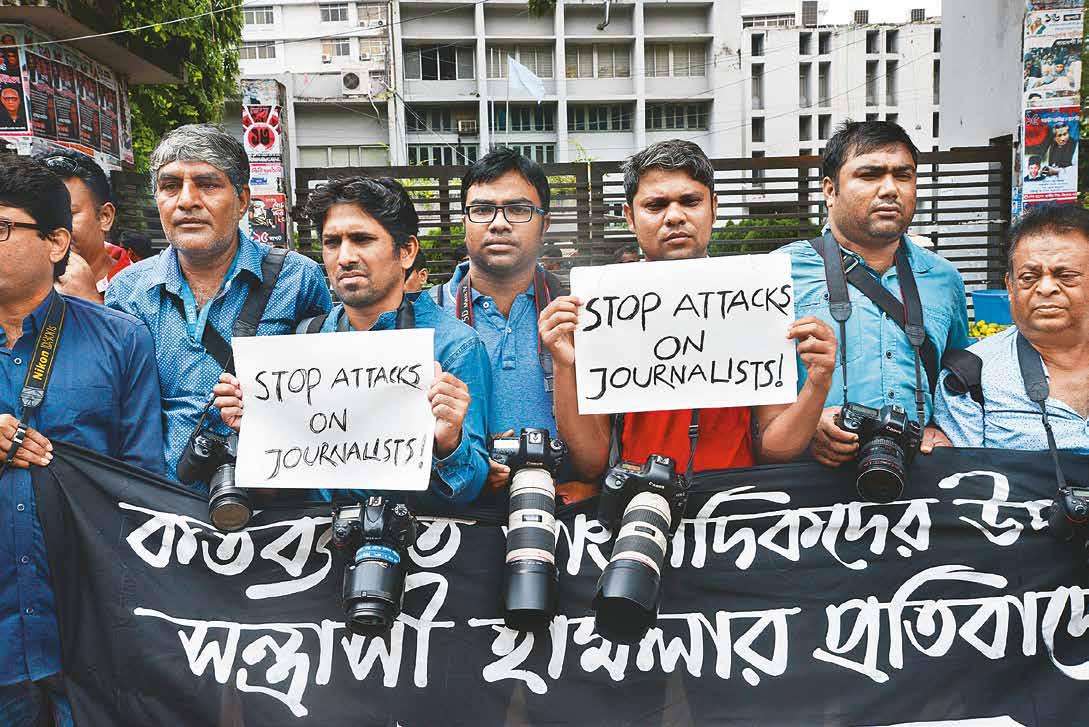
In 2007—at a time when an interim government supported by the military took over—journalist Tasneem Khalil had crossed a ‘redline’. The journalist with The Daily Star had published several reports critical of the military and the police, which not many Bangladeshi journalists wrote about.
On May 10, 2007, he was picked up from his home, blindfolded and reportedly taken to an army camp, where he was tortured. In the following days, Khalil fled Bangladesh and took refuge in Sweden. Over the following decade, Bangladesh’s Press Freedom Index continued on a downward trend. The Digital Security Act (DSA) introduced in 2018—an updated version of the 2006 Information Technology Act—became the most stringent draconian law to muzzle the press. Journalists critical of the ruling Awami League government were brought under DSA charges. A study by the Centre for Governance Studies (CGS) found that 280 journalists were accused of violations, 84 of whom were detained, between October 2018 and August 2022. Against this backdrop, Khalil, while still in exile, set up the Netra News, an independent public interest journalism outlet in Sweden. Netra News’ investigative reportage exposing corruption in the ruling government and abuse of security agencies is a rare feat of journalism.
Outlook’s Senior Editor Shweta Desai spoke to Khalil on running an online news platform from Sweden, tracking political instability and protests in Bangladesh.
How did Netra News start?
When I arrived in Sweden, I was not doing journalism. I worked with think tanks on human rights and pursued academics. In 2018, I saw news videos of protests by young Bangladeshi school students for road safety.
This story is from the {{IssueName}} edition of {{MagazineName}}.
Start your 7-day Magzter GOLD free trial to access thousands of curated premium stories, and 9,000+ magazines and newspapers.
Already a subscriber ? Sign In
This story is from the {{IssueName}} edition of {{MagazineName}}.
Start your 7-day Magzter GOLD free trial to access thousands of curated premium stories, and 9,000+ magazines and newspapers.
Already a subscriber? Sign In

Layers Of Lear
Director Rajat Kapoor and actor Vinay Pathak's ode to Shakespeare is an experience to behold

Loss and Longing
Memories can be painful, but they also make life more meaningful

Suprabhatham Sub Judice
M.S. Subbulakshmi decided the fate of her memorials a long time ago

Fortress of Desire
A performance titled 'A Streetcart Named Desire', featuring Indian and international artists and performers, explored different desires through an unusual act on a full moon night at the Gwalior Fort

Of Hope and Hopelessness
The body appears as light in Payal Kapadia's film

Ruptured Lives
A visit to Bangladesh in 2010 shaped the author's novel, a sensitively sketched tale of migrants' struggles

The Big Book
The Big Book of Odia Literature is a groundbreaking work that provides readers with a comprehensive introduction to the rich and varied literary traditions of Odisha

How to Refuse the Generous Thief
The poet uses all the available arsenal in English to write the most anti-colonial poetry

The Freedom Compartment
#traindiaries is a photo journal shot in the ladies coaches of Mumbai locals. It explores how women engage and familiarise themselves with spaces by building relationships with complete strangers

Love, Up in the Clouds
Manikbabur Megh is an unusual love story about a man falling for a cloud. Amborish Roychoudhury discusses the process of Manikbabu's creation with actor Chandan Sen and director Abhinandan Banerjee